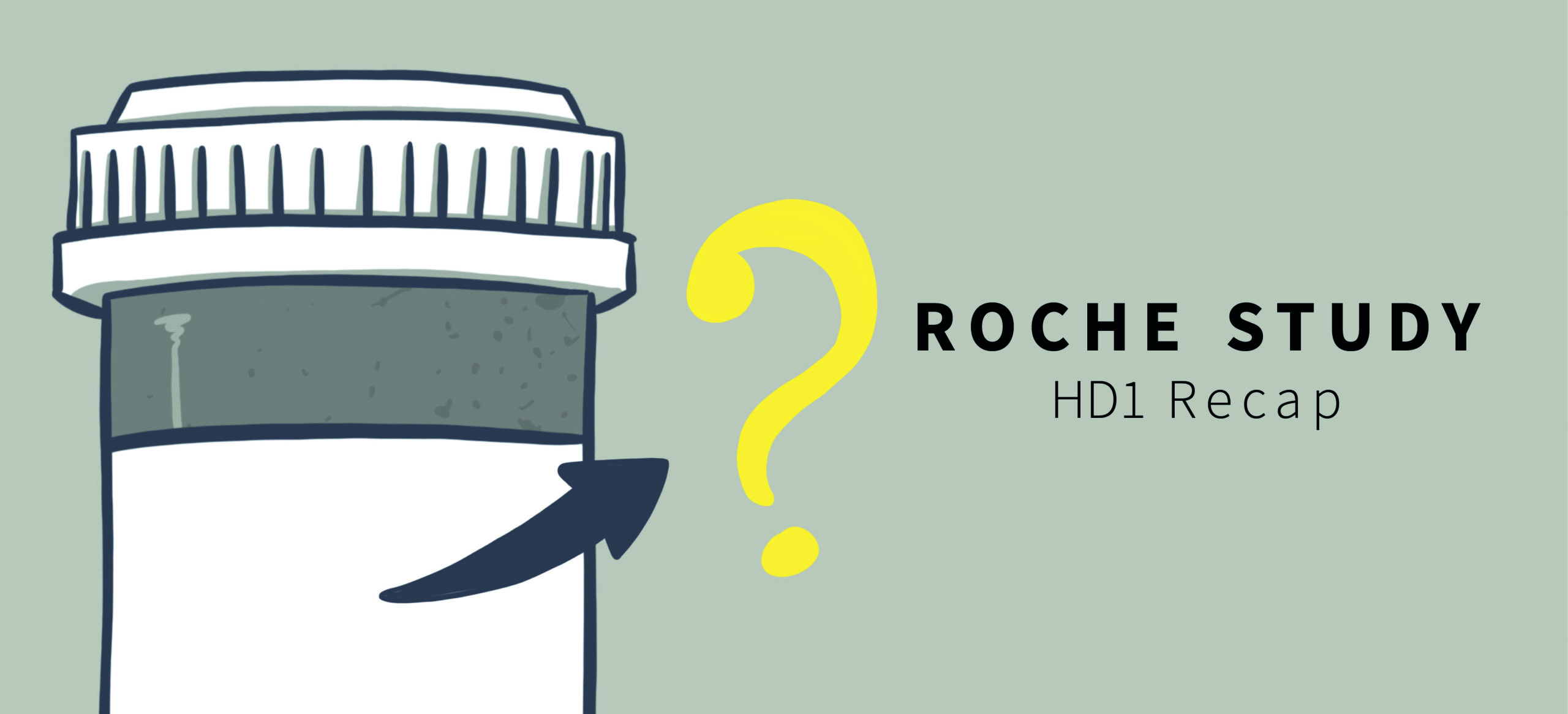Roche HD1 Study Recap

Overview
For more background information on the GENERATION HD1 study, click here. In the past few years, the Generation HD1 study has been of great importance to the Huntington’s Disease (HD) community. This was a clinical study using human subjects. It aimed to investigate the effects of a drug called tominersen, which had previously demonstrated an ability to lower concentrations of the huntingtin protein. Unfortunately, this study was recently paused in March of 2021, leaving many individuals in the HD community with unanswered questions. This review will attempt to explain the original HD1 study, the reasons for its premature conclusion, and future directions for tominersen and the HD community.
Background on HD1 study
To concisely summarize, the study was a Phase III clinical trial conducted by Ionis Pharmaceuticals and Roche. Previous Phase I and II trials had demonstrated the ability of the drug tomineresen to decrease mutant huntingtin protein (HTT) levels. This protein is commonly overexpressed in HD, and it is thought to contribute to HD symptoms . These first two trials showed promising effects, and the doses were well tolerated by participants. The Phase III trial aimed to validate tominersen in a larger cohort of individuals, while focusing more strongly on whether tomineresen improved cognitive and motor symptoms in those with HD.
The study separated participants into three groups: two experimental groups and a control group. The control group received a placebo treatment, which is a harmless, non-efficacious alternative to the drug. This allowed the researchers to compare the effects of tominersen in the experimental group with the non-treatment control group and see if tomineresen provides any true benefit. The two experimental groups had two dosing regimens, with one group receiving the drug every 8 weeks, and the other every 16 weeks. The study was originally slated to finish in June 2022, however, the dosing was cut short in March 2021. Participants are still being followed, and will be until March/April of 2022.
Findings and Conclusion of the HD1 Phase III trial
First and foremost, why was the HD1 study halted? Periodically, data from the study was reviewed by a third party known as an independent data monitoring community (iDMC). This group examined the data during the course of the study, looking at tominersens efficacy and safety. In March 2021, the iDMC ruled that the 8-week tomineresen dosing regimen seemed unfavorable as compared to the placebo, and suggested treatment be stopped to ensure participants safety. The data for the 16-week treatment group was inconclusive at the time.
The researchers then performed further post-hoc analyses, which are analyses taken after collecting and reviewing the data. In doing so, they hoped to discover a specific subgroup of their sample that may still benefit from tominersen. They investigated two variables in looking for this subgroup, both age and CAP score. CAP score refers to the number of CAG repeats an individual has on their huntingtin gene, and is a common marker used to classify the progression and/or intensity of HD. This gave the researchers two strong markers to categorize their sample by, and look for a group that may still receive benefits from tominersen.
First, the researchers looked at composite Unified Huntington Disease Rating Scale scores, or cUHDRs. This is a scale used to measure HD progression in regards to cognition and motor ability, and is a widely used rating method. Looking across their subgroups, they first noted that no specific group showed improvement in the 8-week treatment cohort. However, in the 16-week treatment cohort, they found low age (<48 years) and low CAP score individuals showed favorable cUHDRs upon the trial’s conclusion. This finding was also reflected when measuring total functional capacity (TFC), which is a measure of cognitive capacity. Finally, the researchers noted that the low age, low CAP subgroup reported fewer adverse events (i.e side effects) when compared to both the placebo group and the other experimental subgroups. These findings suggest that younger individuals with lower disease burden may still benefit from a 16-week dosing of tominersen.
Future directions for Roche
While the decision to prematurely discontinue the Generation HD1 study was greatly disappointing to the HD community, the data presented above still offers great insight into HD and avenues for future treatments. Currently, Roche reported they are in the early stages of planning a Phase II tominersen trial, focusing on a group of younger individuals with low disease burden. Roche still feels confident about the safety and efficacy of the drug in this cohort, and data from these individuals could be valuable in generating a future, early-disease treatment.
